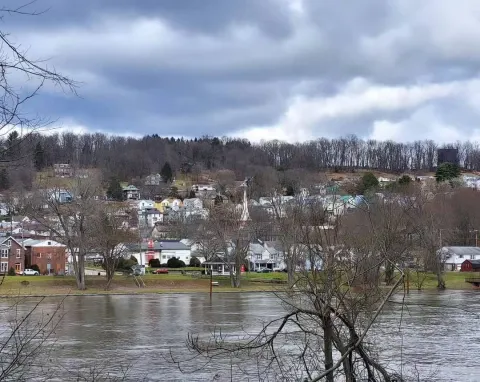Freeport
Nestled along the Allegheny River, Freeport traces its origins to Depreciation Lands—territory granted to Revolutionary War veterans instead of payment, and from two parcels named Union and Friendship, William and David Todd laid out a town in 1796 consisting of 135 lots along Water and Market Streets, known then as Todd's Town.
The town's first home was built by Andrew Patterson, adjoining the old blockhouse. By 1805, eight log cabins stood on Water Street, with Todd's Island offshore creating a natural eddy—perfect for docking rivercraft. David Todd declared, "No dockage fee will ever be charged," making Freeport truly a free port in spirit and name. The town was officially incorporated in 1833.
Around 1806, Edward Hart—a sea captain from Boston—arrived with New England artisans, sparking Freeport's first industry: boatbuilding. They launched vessels with depth and strength fit for the open sea, one of which descended into the river to cheers from townsfolk in a dramatic winter launch.
Later industrial growth included:
- Salt Wells (1820): A well drilled across the river struck oil at 114 feet. By the mid-1800s, James McCulloch and William Ralston refined this oil for lamp use, making Ralston a pioneer of regional oil refining.
- Ice Trade (1830–1855): Ice harvested from Buffalo Creek and the Allegheny was shipped south via barges, helping fuel Freeport's early economy.
During canal construction, Freeport hosted two lively Irish settlements: Garry Owen and Mullengan. Their colorful parades, spirited tavern gatherings, and vibrant racing traditions—on foot and horseback—filled the town with energy and folklore. Notable feats included John Karns leaping 16 feet across a canal lock and Simon Shields earning $50 in a triple jump challenge.
Though the exact founding date is unclear, James Weaver, its first postmaster, began recording accounts by January 1, 1807, marking Freeport's inclusion in the growing network of American correspondence.
From salt wells to schooners, river eddies to Irish parades, Freeport's legacy flows as surely as the Allegheny itself, carrying stories of enterprise, ingenuity, and community spirit.
